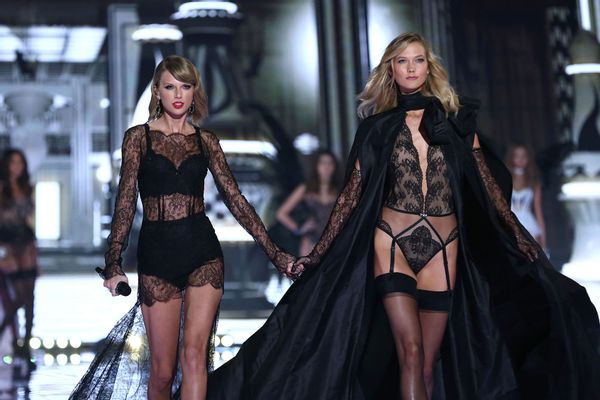
"We're a crooked love in a straight line down." What does this Taylor Swift lyric mean to you? If the answer is some variation of "not much" then you just weren't meant to understand.
It's not that Gaylors are spies uncovering a secret Swift wants hidden, but rather that Swift is trying to communicate her queerness to and only to a sympathetic audience capable of piecing together her hints.
For a hardcore group of Swift fans, who self-identify as "Gaylors," the lyric is just another example of Swift sending the coded message to a select few that she is not straight. When I raised the Gaylor thesis with my undergraduate students a handful had heard it, but most seemed genuinely shocked. Beyond her amazing music career, Swift is best known (probably unfairly) for a series of bad breakups with famous male celebrities. For the Gaylors, this is all surface level; to know the truth, you have to dig deeper.
My introduction to #Gaylor was when I saw a video on TikTok and sent it to a friend. This shifted my algorithm so that I was suddenly receiving a seemingly endless supply of videos on the subject. I was down the rabbit hole. A particularly apt metaphor because Gaylors link Swift's use of "Alice in Wonderland" imagery in her song "Wonderland" to a since-removed tattoo on "Glee" actress Dianna Agron that quoted the book. For Gaylors this was Swift's way of letting them know about their relationship. Model Karlie Kloss, fiddle player Emily Poe, and country singer Kelly Pickler are some other women Gaylors link romantically to Swift via lyrics, statements and Instagram photos. For these fans, it's not that Gaylors are spies uncovering a secret Swift wants hidden, but rather that Swift is trying to communicate her queerness to and only to a sympathetic audience capable of piecing together her hints. The obsessive decoding by Gaylors reminded me of a 20th century thinker known mostly in cloistered philosophy circles, but whose ideas are increasingly manifesting in public discourse.

Gaylors use a variety of Straussian techniques to read between the lines in order to understand what they view as the hidden esoteric meaning of Swift's communications, ranging from her lyrics to the colors she dyes her hair in the video for her song "You Need to Calm Down." An Instagram story where Swift calls Zoe Kravitz "THE CATWOMAN OF DREAMS," points to something far from platonic. Her choice of the color lavender for the special edition of the "Midnights" album, becomes an opaque reference to lesbian movements. Swift saying she was inspired to write the lyrics "you can want who you want boys and boys and girls and girls" by the legalization of gay marriage in New York in a television interview despite the state not passing the law for another three years, was not a mistake, but instead a nod that the lyrics referred to her own queerness. For Gaylors, the fact that the average fan never makes these connections is not an argument against their theories, because they believe the esoteric messages are only meant for them, not the wider fan base.
look at that lavender haze https://t.co/SJDWml4HRM
— Target (@Target) October 21, 2022
QAnon movement has produced an endless amount of commentary deciphering what they view as the hidden esoteric meaning buried in ex-president Donald Trump's tweets, posts and speeches.
Strauss argued that individuals turn to esoteric messaging when they fear persecution; for example, it was particularly popular among dissidents in the Soviet Union. Coming out will not likely see Swift sent to the Gulag, but she could fear it would damage her career. Swift got her start in country music, a genre known as the most conservative. She would have witnessed the excommunication of The Chicks in 2003 for opposing the Iraq war and Billboard booting (then closeted) Little Nas X's "Old Town Road" from its country chart for including trap beats. (Little Nas X claims he was communicating his queerness to fans with his lyrics to "C7osure"and the artwork on his album, prior to his official coming out, which gives more credence to the idea that Taylor could be doing the same.)
Despite showing signs of being more open to queer people, many country stars claim their management told them to stay in the closet. Swift has transcended her origin as a country singer, but may fear a more explicit coming out could damage her cross genre appeal and spot as the only woman in the Top 10 Highest-Paid Musicians. One Gaylor reviews the intense reaction to a recent Rolling Stone article that discusses the Gaylor thesis as proof that a more explicit coming out would provoke a massive backlash among a sizable segment of Swift's straight fans.
Of course, all these hidden messages could be nothing but the overactive imagination of a group of largely queer Swift fans that want to claim the singer as their own. The Gaylors refer to this as the "Hetlor" thesis (Hetlor being a deeply unfortunate portmanteau of heterosexual and Taylor). Just because people see hidden messages does not mean they are there.

This was always a potential problem with Straussian thought. Were 20th century Straussians discovering hidden messages in ancient texts or imposing new meanings on the works of long dead figures that could never be definitively refuted? Even Swift declaring that LQBTQ was a "community that I'm not a part of" can be written off by Gaylors as part of her esoteric messaging.
While some of the Gaylor arguments have a surprising amount of persuasive force, others are probably more reflective of pareidolia, the human ability to make patterns and meaning out of randomness. The overwhelming amount of content produced by the Gaylor and QAnon groups speaks to how Strauss' theory of esoteric writing seems tailor-made to explain much of our current media environment. With a public figure like Swift putting so much information into the world – obviously songs, but also interviews, posts and fashion choices – creators on YouTube, TikTok and Twitter have an endless supply of material to mine for "hidden messages" they can turn into likes, subscribers and comments.
The release of Swift's 10th album "Midnights," did not coincide with an official coming out, as many Gaylors had predicted it would. Nevertheless, for Gaylors, "Midnights" has provided ample new evidence of Swift esoterically communicating her queerness. In "Question . . . ?" Swift sings:
Can I ask you a question?
Did you ever have someone kiss you in a crowded room?
And every single one of your friends was making fun of you
But 15 seconds latеr, they were clapping, too?
Thеn, what did you do?
Did you leave her house in the middle of the night? (Ohh)
Did you wish you'd put up more of a fight? (Ohh)
When she said it was too much?
Do you wish you could still touch her?
It's just a question
For Gaylors this is a reference to a kiss that may have occurred between Swift and Kloss at a concert in 2014 and at the very least the use of feminine pronouns to describe her partner does align nicely with a queer reading of the song. In "Maroon" Swift sings, "The lips I used to call home, so scarlet, it was maroon." Gaylors have pointed to this as a reference to lipstick, which would not fit with any of Swift's male partners. One Gaylor says simply, "There is no heterosexual explanation" for this line. Detractors can respond that the lyrics are ambiguous or may not be sung from Swift's perspective.
Ultimately the release of "Midnights" has left open the question of Swift's sexuality, which means Gaylors will keep interpreting her work through a lavender haze.







